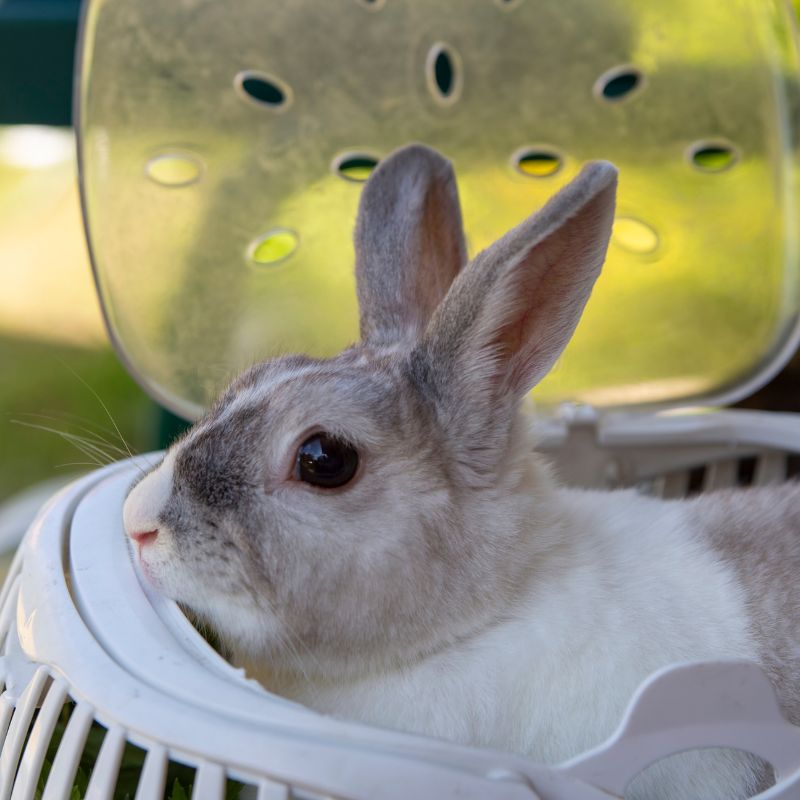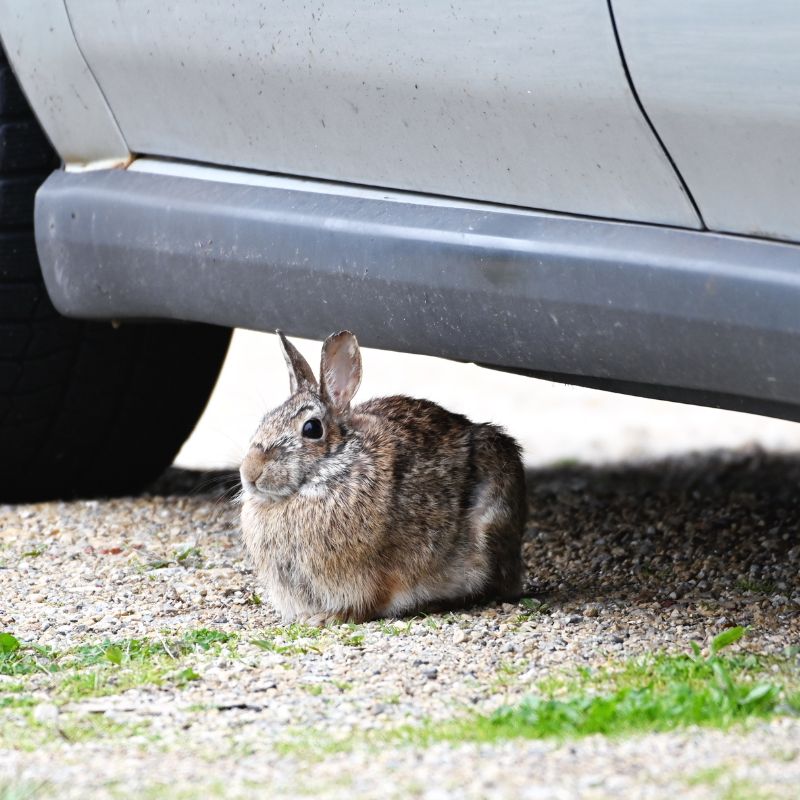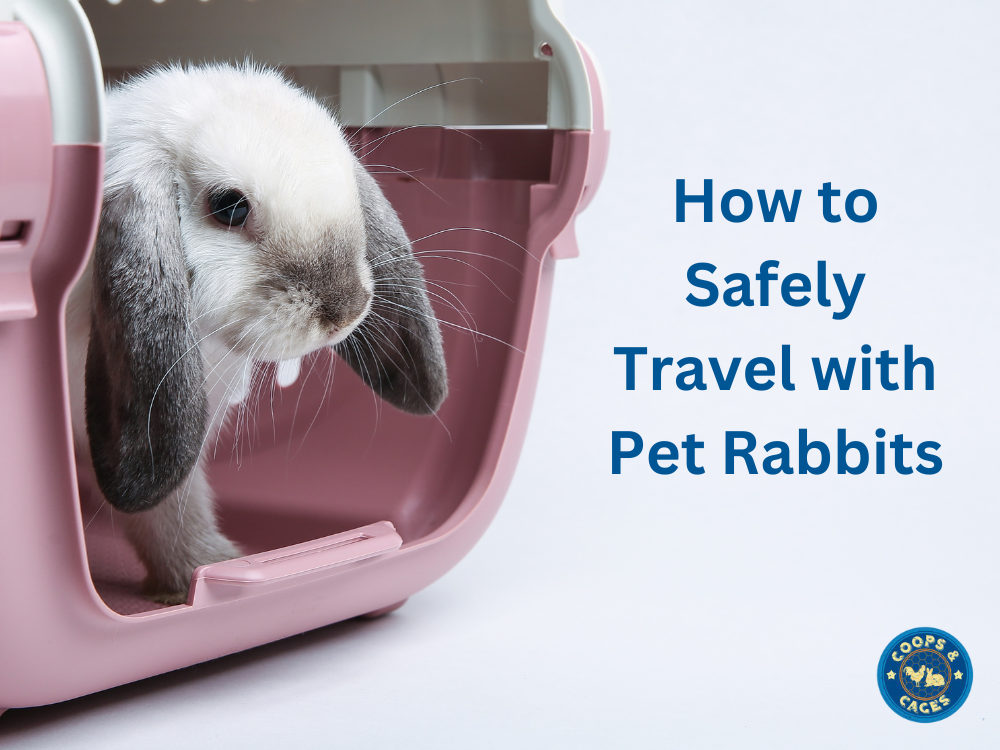How To Do Things, Rabbits
How to Safely Travel with Pet Rabbits
Planning a long trip and can’t bear to leave your beloved rabbit behind? Fear not! While traveling with bunnies may seem daunting, with the right preparation and care, it can be an enriching experience for both you and your fluffy friends.
From safety tips to creating a cosy travel haven, we’ve got you covered. Join us as we delve into the art of safely traveling with pet rabbits, ensuring a hoppy journey for all involved.
Pack Food and Water
Before you embark on your journey, make sure you pack ample supplies to keep your bunny nourished and hydrated throughout the trip. Rabbits are creatures of routine, and a sudden change in diet or access to water can be unsettling for them.
Ensure you bring along enough of their usual food to last the duration of your travels, plus a little extra, just in case. Don’t panic if they don’t eat much – this is normal when in an unfamiliar environment.
Opt for a sturdy water bottle that can easily clip to the side of their travel cage, providing a constant source of fresh water to keep them hydrated on the go.
Pack Supplies
When preparing for your holiday, ensure you gather all the necessary supplies to keep your rabbit comfortable and content throughout the journey.
Pack plenty of absorbent bedding for the base of their travel cage. This is not only to provide a comfy environment to rest in but also to absorb any wee or poo.
Also pack essential cleaning supplies to maintain hygiene during the trip, such as pet-safe disinfectant wipes, a small broom and dustpan, and rubbish bags.
Consider bringing along a portable playpen to give your rabbit a chance to stretch their legs and exercise during rest stops along the way.
Additionally, don’t forget to pack familiar items from home, such as their favourite toys or blankets, to provide them with a sense of security in unfamiliar surroundings.
Practise Car Travel
Preparing your bunny for a long car journey begins with gradual exposure to the experience of traveling by car. Start by incorporating short car trips into your routine, allowing your rabbit to acclimate to the sensations and sounds of being on the move.
Begin with brief excursions around the neighbourhood or to nearby destinations, gradually extending the duration as your bunny becomes more accustomed to the experience.
Use these practise trips as an opportunity to observe your rabbit’s behaviour and comfort level, making adjustments as needed to ensure their well-being during longer journeys. Consider providing familiar comforts, such as their favourite treats or a cosy blanket, to help alleviate any anxiety they may experience.
By gradually introducing your bunny to car travel in a positive and reassuring manner, you’ll help build their confidence and readiness for longer adventures on the road ahead.

Keep Them Cool
Rabbits are sensitive to extreme temperatures, so it’s essential never to leave them unattended in a carrier. With temperatures soaring outside, the inside of your car can quickly become uncomfortably hot, posing a risk to your bunny’s well-being.
Keep them cool and refreshed by providing access to water throughout the journey.
Opt for shady parking spots during stops and crack open the windows to promote air circulation. In case your car’s air conditioning isn’t functioning optimally, you can improvise by placing a damp towel over the carrier or wrapping ice cubes in a towel to help lower the temperature.
Prioritising their comfort and safety will help prevent heat stroke and other health issues while traveling.
Research the Rules
If you’re traveling via plane with your rabbit, it’s crucial to understand and adhere to airline regulations. Different airlines have varying requirements and restrictions regarding pet travel, so thorough research is essential.
While some airlines permit rabbits to accompany you in the cabin, others may require them to travel in the cargo hold.
If your furry friends are flying in the cargo area, ensure you use an airline-approved carrier and include absorbent linings to manage any accidents. Additionally, providing leafy greens such as carrots and parsley inside the carrier can help keep your rabbits hydrated and satisfied during the journey, even if they’re unlikely to eat them.
Visit the Vet Beforehand
Before embarking on a long journey with your rabbit, it’s essential to schedule a visit to the veterinarian for a thorough health checkup. This pre-emptive measure ensures that your furry friend is in optimal health and fit for travel.
For rabbits with pre-existing medical conditions, such as respiratory issues or gastrointestinal sensitivities, this step becomes even more critical. Your veterinarian can provide valuable insights and recommendations to address any specific health concerns and ensure your rabbit’s well-being during the trip.
Additionally, don’t forget to stock up on any necessary medications or supplements prescribed by your vet to manage existing conditions and prevent potential health complications while on the road.

Invest in a Good Quality Travel Cage
Investing in a high-quality travel cage is paramount when journeying with your rabbit. Not only does it ensure their safety and comfort, but it also promotes a stress-free travel experience for both you and your furry companion.
Rabbits hopping freely within the vehicle can be distracting for the driver and pose a risk of injury to the rabbit in case of sudden stops or turns.
At Coops and Cages, we offer two excellent options to suit your needs: the Small Rabbit Carrier and the Small Rabbit Crate. Both options provide secure and cosy environments for your rabbit during travel, featuring escape-proof latches and ample ventilation.
With a reliable travel cage in place, you can rest assured that your rabbit will remain secure and content throughout the journey, allowing you to focus on the road ahead.
Ian’s Wrap
Traveling with your pet rabbit can be a rewarding experience with the right preparation.
From packing essential supplies and practising car travel to researching airline regulations and visiting the vet beforehand, prioritising your rabbit’s well-being ensures a safe and enjoyable journey. Invest in a quality travel cage for added security.



